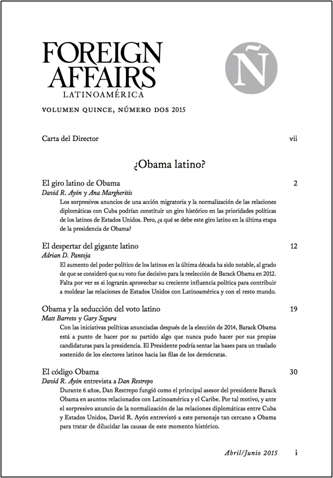Conventional wisdom in political analysis holds that late-term presidents turn to foreign affairs as their domestic clout wanes, a natural tendency that President Obama likely anticipated even before taking office. A major distinguishing factor in the case of the Obama presidency, however, is the unprecedented growth and evolution of Latino political influence, evidence of which can be seen in the assertive course the President has charted since the 2014 midterm elections.
Obama’s executive action on immigration in November, followed in December by his move to restore diplomatic relations with Cuba, led to a collaboration between Latino Decisions and Foreign Affairs Latinoamérica, the Spanish-language edition of Foreign Affairs magazine based in Mexico City, to produce a set of articles and interviews for their current issue, on the theme of the Latino turn in the Obama presidency. This special themed section and issue were timed to coincide with the President’s participation in his third and last Summit of the Americas, held in Panama last month.
The first article traces the two policy moves to commitments Obama made to Latino constituencies as a candidate in 2007-08. LD Senior Strategist David Ayón and his colleague Ana Margheritis argue that the Obama team promised reform of immigration policy to appeal to Latino voters generally, and reform of policy toward Cuba to cultivate a growing segment of Cuban Americans interested in greater freedom of contact with the island. The latter policy change was effected by three sets of executive actions, taken in 2009, 2011 and culminating at the end of 2014. Executive action on immigration was subordinated to efforts to induce legislated reform from Congress until mid-2012, when Obama first announced DACA, which was extended in 2014 and augmented by the new DAPA program.
In his article, LD Senior Analyst Adrian Pantoja challenges the stereotype that Latinos are narrowly focused on domestic issues and unconcerned with international affairs. Using data from the Latino National Survey, Pantoja argues that Latinos are transnationally connected and by extension internationally oriented, which, as their political influence continues to develop, may in time come to serve as a basis for shaping hemispheric relations.
Matt Barreto and Gary Segura trace the evolution of Barack Obama’s relations with the Latino electorate since 2008, and conclude that his late moves on immigration policy and Cuba, in combination with Republican hostility to immigration reform, may have the effect of binding Latino voters to the Democratic Party in a lasting way. The three articles are complemented by charts prepared by Sylvia Manzano and interviews conducted by David Ayón with Dan Restrepo and Richard Feinberg.
Restrepo was Obama’s senior advisor on Latin America from the 2007-08 campaign through his reelection in 2012, serving at the White House in the first term as Senior Director for the Western Hemisphere of the National Security Council. Feinberg served in the State Department during the Carter Administration, which also attempted to normalize relations with Cuba, and directed Latin America policy at the National Security Council during the first Clinton term. Feinberg proposed and organized the first Summit of the Americas, held in Miami in 1994.
Latino Decisions has responded to international interest in the development of Latino political influence in the United States in an expanding number of ways. In 2012, Barreto and Segura headlined the “Yo Decido: Voto Latino en Estados Unidos” conference at the Instituto Tecnológico Autónomo de México (ITAM) and the Club de Industriales in Mexico City, sponsored by the Mexican Council on Foreign Affairs, Foreign Affairs Latinoamérica and the ITAM International Studies Department. The conference focused on the prospective impact of the Latino vote on that fall’s presidential elections.
In 2013, Sylvia Manzano headlined a workshop at the Mexican Foreign Ministry on Mexico’s relations with Latinos in the United States. Latino Decisions has published a regular column on Univision.com since mid-2014, written by David Ayón. Ayón served as guest editor of the current issue of Foreign Affairs Latinoamérica, on behalf of Latino Decisions. Gary Segura will be featured at a presentation and discussion of this special edition of the magazine at the Barcelona Center for International Affairs (CIDOB) later this month.
David R. Ayón is Senior Strategist and Advisor at Latino Decisions. He is also a Senior Fellow at the Center for the Study of Los Angeles at Loyola Marymount University, a member of the Council on Foreign Relations, and a director of the U.S.-Mexico Foundation.


